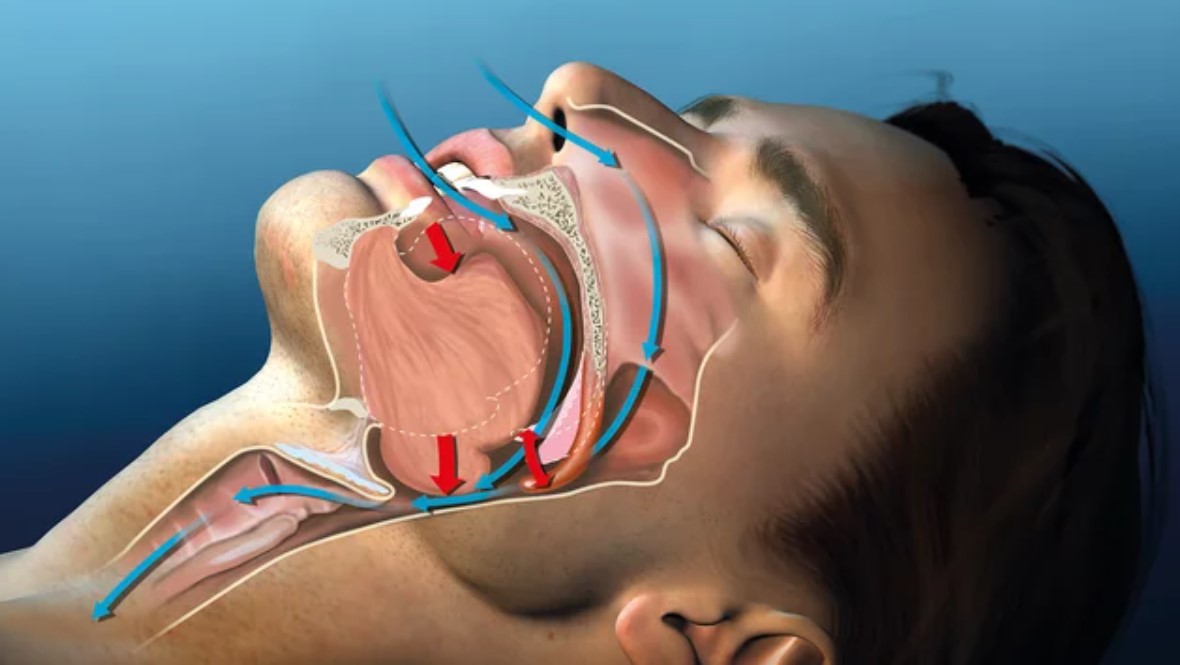Snoring is more than a nightly nuisance. Instead, it’s a widespread sleep phenomenon that affects countless sleep-deprived people worldwide. You might be familiar with the sound from a sleeping partner or recognize it in yourself. While often considered a minor annoyance, a snore can significantly impact sleep quality for the person and those around them.
If you find it loud enough to disturb sleep or you wake up feeling tired, it’s important to consult with a physician. Persistent or severe snoring could indicate underlying health issues that require professional attention. Remember, while the insights shared here aim to inform and guide you, they are no substitute for the tailored advice and treatment a physician can provide based on your specific condition…Click Here To Continue Reading>> …Click Here To Continue Reading>>
This nighttime noise happens when airflow through the mouth and nose is partially obstructed during sleep. As you drift off, the throat muscles relax, narrowing the airway. The more constricted the airway becomes, the more forceful the airflow becomes, causing the tissues in the mouth, nose, or throat to vibrate, resulting in the snoring sound.
The reasons for this airway obstruction can vary widely, ranging from anatomical peculiarities, such as the shape of your nasal passages or the size of your tonsils, to lifestyle factors like obesity, alcohol consumption, and sleeping position. Medical conditions, including allergies, sinus infections, and sleep apnea, can significantly affect how and why people snore. This broad range of causes suggests that the solutions are equally varied, necessitating a holistic approach to managing or eliminating your issue. Let’s explore these causes more deeply and discuss actionable ways to tackle them, enhancing your sleep quality and overall health.
For many, the structure of their airway naturally predisposes them to snoring. A
narrow throat,
for instance, can significantly amplify the likelihood of airway obstruction during sleep. This physical trait causes the air to rush through the tighter space, leading to increased tissue vibration, which produces the snoring sound.
Solution:
If snoring affects your daily life, consider speaking with an Ear, Nose, and Throat (ENT) specialist. They can assess your throat, nose, and mouth to determine if anatomical features like narrow air passages contribute to snoring. An ENT can make recommendations to widen the airway and alleviate snoring.
Enlarged tonsils
are a frequent cause in both children and adults. When tonsils are oversized, they can block the airflow during sleep, leading to snoring. This is particularly noticeable if snoring worsens over time or starts suddenly.
Solution:
A consultation with a physician can determine if your tonsils cause snoring. If so, a tonsillectomy—surgical removal of the tonsils—may be recommended. This procedure can open up the airway and significantly reduce or eliminate snoring.
A
deviated septum
occurs when the nasal septum—the structure that divides the nasal cavity in half—is significantly off-center or crooked. This can make breathing difficult and cause you to breathe through the mouth while sleeping, contributing to snoring.
Solution:
Corrective surgery, known as septoplasty, can straighten the nasal passage and help alleviate breathing issues and snoring. This surgery is typically recommended after a thorough evaluation by an ENT specialist.
Excessive body weight
, especially around the neck, can compress and narrow the airway, increasing your risk factor. Fat deposits around the upper airway can also obstruct normal breathing during sleep.
Solution:
A healthy diet and a regular exercise regimen can help reduce body weight, which can, in turn, reduce snoring. Even a small amount of weight loss can open the throat and improve symptoms.
Alcohol is a potent muscle relaxant that reduces the natural defenses against airway obstruction. Drinking alcohol, especially before bedtime, can relax the throat muscles excessively, leading to snoring.
Solution: Limiting alcohol consumption
, particularly in the hours before you go to sleep, can help reduce snoring. Aim to have your last drink at least four hours before bedtime.
Smoking irritates the mucous membranes and can cause swelling and narrowing of the airways. It also decreases lung function, which can exacerbate snoring.
Solution:
Quitting smoking can have immediate benefits for your overall health, including a reduction in snoring. Various cessation programs and tools are available to help you quit, including counseling, medications, and nicotine replacement therapies.
Not getting enough sleep can lead to deeper sleep when you do rest. Thus, it further relaxes the muscles in the throat and increases the likelihood of snoring.
Solution:
Establishing a regular, healthy sleep schedule, allowing for 7 to 9 hours of sleep each night, can help reduce the intensity of snoring. Keeping a consistent bedtime and wake-up time also stabilizes sleep patterns and improves sleep quality.
Sleeping on your back might be comfortable, but it can also exacerbate snoring. This posture allows the base of the tongue and soft palate to stick to the back wall of your throat, causing a vibrating sound during sleep.
Solution: Switching to side sleeping
can help prevent this. Using body pillows for support can make side sleeping more comfortable and sustainable throughout the night. Additionally, special pillows designed to keep snorers on their sides are available and can be an effective remedy.
The type of
pillows and mattresses
can also significantly affect how well you breathe at night. Old or overly soft pillows might not provide enough neck support, leading to a kinked airway.
Solution:
Investing in firmer pillows that elevate your head and align with your spine can reduce snoring. Similarly, a supportive mattress with a proper sleeping posture can help minimize snoring by keeping your airways open.
can swell the nasal passages and restrict airflow. That forces you to breathe through your mouth, increasing the likelihood of snoring. Pollen, dust mites, and pet dander are frequent irritants that can lead to this condition.
Solution:
It is crucial to consult with an allergist for testing and diagnosis. Depending on the type of allergy, your doctor can find an effective treatment to reduce symptoms. Keeping your sleeping area clean and free of allergens can also help alleviate snoring caused by allergic reactions.
Colds and sinus infections can cause temporary snoring by blocking the nasal passages with excess mucus. This forces you to breathe through your mouth, which can lead to less airflow.
Solution:
Over-the-counter decongestants and nasal sprays can reduce nasal congestion, making breathing easier and potentially reducing snoring. It’s important to use these medications as directed and consult a doctor if snoring persists or the infection seems severe. READ FULL STORY HERE>>>CLICK HERE TO CONTINUE READING>>>
Chronic respiratory conditions like asthma can also contribute to snoring. Asthma inflames and narrows the airways, not just in the lungs but also in the nasal passages, which can lead to snoring.
Solution:
Proper asthma management is critical. This includes using prescribed inhalers correctly, avoiding asthma triggers, and regularly consulting with your healthcare provider to ensure your asthma remains well-controlled. Improving asthma symptoms can help reduce snoring, especially if the snoring is a secondary result of an exacerbated condition.
As we age, the muscle tone in our bodies, including the throat, naturally decreases. This reduction in muscle tone can cause the throat to be more likely to collapse during sleep, leading to snoring.
Solution:
Throat exercises designed to strengthen the muscles around the airway can be beneficial. Simple exercises such as repeating vowel sounds, practicing tongue curls, and even singing can help tighten the throat muscles and reduce snoring.
indicates that men are more prone to snoring than women, primarily due to differences in airway anatomy, fat distribution, and hormonal differences that influence the likelihood of airway obstruction.
Solution: Awareness and routine check-ups can help manage snoring issues early. Men should be particularly vigilant about changes in their snoring patterns and discuss these with a physician during regular health assessments.
Genetic predispositions can influence the shape of airway structures like the jaw, throat, and nasal passages. These add to snoring risks inherited from family members.
Solution:
Understanding your family’s health history can provide insights into potential risks. Combining this awareness with managing other controllable factors, such as weight and alcohol consumption, can mitigate some of the inherited risks of snoring.
Sedatives impact the central nervous system, causing excessive relaxation of muscles throughout the body, including the throat muscles. This relaxation can exacerbate or lead to snoring, allowing the airway to narrow or collapse during sleep.
Solution:
If you suspect your medication contributes to snoring, discuss this with your doctor. Adjusting prescriptions or the timing of your dosage might be necessary to reduce the side effects of snoring.
Like sedatives, muscle relaxants can decrease the natural tone of muscles around the throat, increasing the risk of snoring due to partial airway collapse.
Solution:
It’s important to review all current medications with your doctor to determine if they could be contributing to snoring. Alternative medications or adjusted dosing schedules may help alleviate this issue.
Large meals closer to bedtime can lead to snoring by pushing up on the diaphragm, affecting your breathing patterns while you sleep.
Solution:
Avoiding heavy meals within two to three hours of going to bed can prevent this type of snoring. Opt for lighter, easier-to-digest meals in the evening to improve sleep quality and reduce snoring.
Inadequate hydration leads to thicker nasal mucus and dryness in the throat, which can increase snoring by creating more friction in the airway during breathing.
Solution:
Ensuring adequate daily water intake is simple yet effective. The
9 fluid cups of water daily for women and 13 for men. However, this amount can vary based on individual needs and activity levels.
Menopause can often lead to snoring due to hormonal changes that affect the throat’s muscle tone and nasal passages. These changes, combined with the general weight gain often associated with menopause, can increase the likelihood of airway obstruction during sleep.
Solution
: Hormone replacement therapy (HRT) may help some women manage the symptoms of menopause that contribute to snoring. Additionally, lifestyle adjustments such as healthy weight, regular physical activity, and creating a conducive sleep environment can be beneficial. Consult your physician to determine the best strategies for individual needs during this life stage.
Sleep apnea is a sleep disorder in which breathing repeatedly stops and starts during sleep. This condition often leads to loud snoring and chronic fatigue. Snoring can occur when the airway becomes obstructed during sleep as the body struggles to breathe.
Solution:
Continuous Positive Airway Pressure (CPAP) machines are one of the best options for alleviating sleep apnea. These devices keep your airway open during sleep by providing a constant air stream through a mask. Other treatments include lifestyle changes or dental devices. In fewer cases, doctors may suggest surgical remedies.
Hypothyroidism can lead to snoring by reducing muscle tone and contributing to the relaxation of the airway. Low thyroid levels can also lead to weight gain, another contributor to snoring.
Solution:
A simple blood test can diagnose thyroid function. If hypothyroidism is contributing to your snoring, thyroid hormone replacement therapy may help. Managing your thyroid levels can significantly reduce snoring.
Weight gain and hormonal changes during pregnancy can lead to increased snoring. Swelling in nasal passages and weight gain around the neck can narrow the airways and change sleep patterns.
Solution:
Regular prenatal check-ups will monitor for gestational diabetes and high blood pressure that can exacerbate snoring. Sleeping on the side, using extra pillows for support, and maintaining a healthy diet and exercise regime can also help manage snoring during pregnancy.
Here are some things that can help decrease the likeliness someone will expereince this problem.
Various over-the-counter snoring aids can help alleviate mild to moderate issues. These include nasal strips, which help open nasal passages from the outside, and mouthpieces, which hold the jaw or tongue in a position that keeps airways open.
Try different devices to find the best one for you. Some people may benefit from a custom-fitted device made by a dental specialist, while others find relief with simpler solutions like nasal strips.
Comprehensive lifestyle changes can have a positive effect. Reducing stress, increasing physical activity, and managing weight are all beneficial.
Yoga and mindfulness reduce stress, improve overall body awareness, and encourage better sleep habits. Consistency in your sleep schedule, avoiding alcohol before bedtime, and staying at a healthy weight can also help.
Addressing snoring is about improving the quality of your sleep and enhancing your overall health and well-being. While the solutions offered here cover many possibilities, every person’s situation is unique. Getting professional medical advice for a tailored treatment plan is crucial.
We encourage you to explore these solutions and discuss them with your physician to find the most effective strategies for your needs. Remember, taking steps to manage your condition can lead to better sleep, improved health, and greater happiness. Let this motivate you to tackle your health concerns head-on and move towards a quieter, more restful night.


 IN-THE-NEWS9 months ago
IN-THE-NEWS9 months ago
 SPORTS10 months ago
SPORTS10 months ago
 METRO5 months ago
METRO5 months ago
 METRO9 months ago
METRO9 months ago
 IN-THE-NEWS9 months ago
IN-THE-NEWS9 months ago
 METRO10 months ago
METRO10 months ago
 IN-THE-NEWS5 months ago
IN-THE-NEWS5 months ago
 SPORTS9 months ago
SPORTS9 months ago


